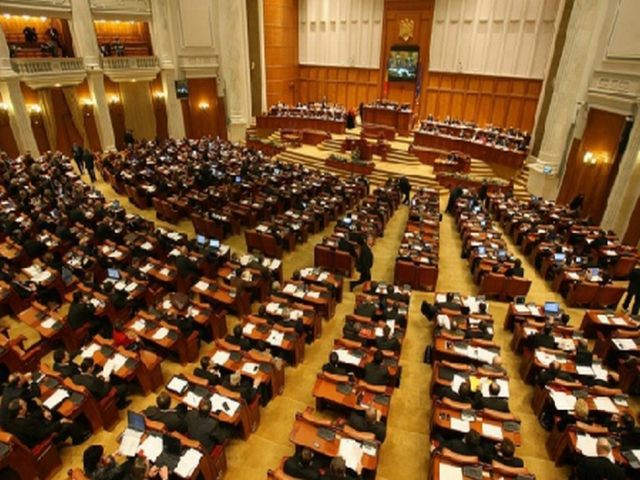2016 state budget. The Romanian Government will hold a public
debate on Wednesday to discuss the priorities and structure of the 2016 state
budget. The budget bill is to be approved by the government this week, before
being submitted to Parliament for debate and approval. The ministries of
defence, interior, education and health will be allocated the largest amount of
funds next year. Less money will go to the ministries of labour and transport.
Budget returns in 2016 are expected to grow by approximately 800 million euros
compared with 2015, while expenses are to grow by 2.9 billion euros, to make up
for the fiscal relaxation measures already approved by Government and
Parliament. The new budget is based on a budget deficit level of maximum 3% of
the GDP, in keeping with the EU ceiling, and a 4.1% economic growth rate.
Army exercises. Romanian military
started training on Monday, alongside troops from the US and the Republic of
Moldova, at the Smardan shooting range, in south-eastern Romania, as part of
the Platinum Lynx 16.2 Black Sea Rotational Force exercise. This exercise is
aimed at continuing the joint training of the military, increasing the level of
interoperability between the participant forces and strengthening their
partnership. In parallel, some 200 Romanian soldiers and 350 US military are
taking part in the Dacian Thunder exercise at the army air bases in Mihail
Kogalniceanu, south-eastern Romania, and in Campia Turzii, in the west. The
exercise comes to an end on December 20th. According to the Romanian
defence ministry, Dacian Thunder, which is now in its second year, is aimed at
increasing staff interoperability, ensuring an exchange of experience and
improving the training of both Romanian and US military staff, in keeping with
the NATO standards.
French elections. France’s far-right National
Front is the big winner of the first round of regional elections held on
Sunday. With a record national score of 30% of the votes, the Front pulled
ahead of both the moderate right, in opposition, and the ruling Socialist
Party. Commentators say the second round, due on December 13th, may
confirm the rise of the far-right, whose anti-immigration and anti-Islam
discourse has become more and more appealing to voters following last month’s
attacks in Paris.
Ukraine-Biden. Ukraine still has a lot of hard work to do on
reforms, in particular the fight against corruption, said US vice-president Joe
Biden on Monday in Kiev, in a joint press conference with Ukraine’s president
Petro Poroshenko. Biden announced new US financial aid of 190 million dollars
to help Ukraine fight corruption, a scourge which, almost two years since the
regime change in Kiev and despite the promises of the new authorities, is still
a problem in this country. Also on Monday, Biden called on Moscow to fulfil the
peace deal in Ukraine’s pro-Russian east and hand back to Kiev the Crimean
peninsula which it annexed in 2014.
Humanitarian appeal. The United Nations is seeking 20 billion dollars in funding to help some
87 million people from 37 countries next year, the largest humanitarian appeal
in history, said the UN under-secretary-general
for humanitarian affairs Stephen O’Brien in Geneva. He said conflicts and disasters have driven millions of children, women and men to the edge of survival. The
humanitarian appeal for 2016 is based on response plans and strategies in 27 crises in 37 different countries
around the world. The conflicts in Syria, Iraq, Sudan and Yemen will remain
among the greatest drivers of prolonged humanitarian needs in 2016, according
to the United Nations.
Britain-EU. Uncertainty
over the UK’s future in the EU is destabilising Europe. That is why we must
find a way to answer the British concerns as quickly as possible, said the
president of the European Council Donald Tusk on Monday. In a letter to EU
leaders, who are due to meet on the 17th of December in Brussels for
the winter summit, Tusk said reaching an agreement with the authorities in
London is a matter of urgency. He said there is strong will among member
states to find solutions that respond to the British requests with regard to
the reform of the European Union, but that there is presently no consensus on
Britain’s proposal to restrict benefits for people coming to the UK from the
EU.
Pollution. The Chinese authorities have issued the first ever red smog alert, in
place from Tuesday until Thursday, and have taken exceptional measures. The
alert comes as smog engulfs Beijing for the second time this month. According
to the World Health Organisation, the air pollution level has in some places
exceeded 40 times the recommended limit. The authorities have decided to close
nurseries, schools and factories, halt all building works and impose
restrictions on car travel.
Handball. The Romanian women’s handball team on Monday
defeated Kazakhstan 36:20 in their second match at the World Championship
hosted by Denmark. In their first match on Saturday, Romania won against Puerto
Rico 47:14. In their next fixture on Tuesday, Romania face Spain. Their group
also includes Norway and Russia. The four best-ranked teams in each group will
qualify for the round of last 16. The World Championship is important for the
teams’ qualification for the Olympic Games in Rio. The winner of the
championship will qualify automatically, while the teams in places 2-7 will
play the Olympic test events in April 2016. Romania are the only team to have
taken part in all editions of the World Championship since 1957, winning three
medals in the process: gold in 1962 and silver in 1973 and again in 2005.
(Edited and translated by: C. Mateescu)




